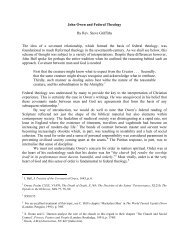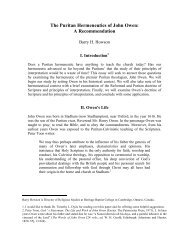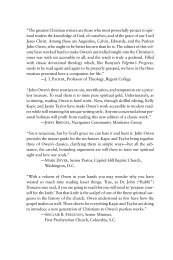M.TH. LONG DISSERTATION (LD6.1) - John Owen
M.TH. LONG DISSERTATION (LD6.1) - John Owen
M.TH. LONG DISSERTATION (LD6.1) - John Owen
You also want an ePaper? Increase the reach of your titles
YUMPU automatically turns print PDFs into web optimized ePapers that Google loves.
<strong>John</strong> <strong>Owen</strong>’s Theological Context<br />
obedience imputed to them. In all of this, the integrating factor is the will of God. 178<br />
He willed that Christ should make satisfaction for the elect; he willed that Christ’s<br />
satisfaction should be applied to the elect; and he willed that the accomplishment and<br />
application should happen at separate points in time. As Trueman notes, ‘<strong>Owen</strong> does<br />
not use Christ’s objective satisfaction as some kind of logical axiom which forces him<br />
into placing the actual justification of individuals in eternity or at the moment of<br />
Christ’s death.’ 179<br />
In contrast to Saltmarsh, <strong>Owen</strong> also demonstrates a far more nuanced account<br />
of union with Christ. Saltmarsh treats union with Christ in eternal election as identical<br />
with mystical union, which provides the immediate ground of justification. <strong>Owen</strong>,<br />
however, acknowledges that full, mystical union occurs at the point of faith. Prior to<br />
that, the relationship between Christ and the elect exists in the intention and will of<br />
God, but does not exist as an actual union; from eternity we might describe the elect as<br />
decretally united to Christ. Thus, although the elect are chosen ‘in Christ’ and<br />
although, contra Baxter, their relation to him in God’s will secures the justice of the<br />
atonement, this is not, for <strong>Owen</strong>, the same as saying that the elect have always been<br />
united with Christ in an undifferentiated fashion.<br />
<strong>Owen</strong> offers a more detailed set of arguments against justification from the time<br />
of the atonement in Of the Death of Christ. 180 According to <strong>Owen</strong>, although God’s will<br />
toward the elect was not changed upon the death of Christ, for he is immutable, 181<br />
178 Trueman 1998a: 213.<br />
179 Trueman 1998a: 213.<br />
180 Cf. Boersma 1993: 103-108; Trueman 1998a: 218-220.<br />
181 <strong>Owen</strong> 1850-55: X.458; cf. 451-53.<br />
49





